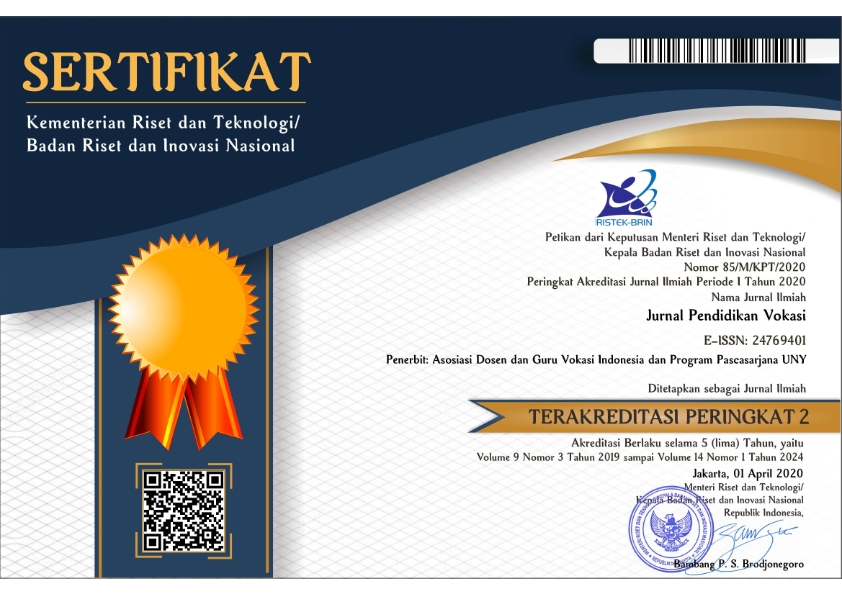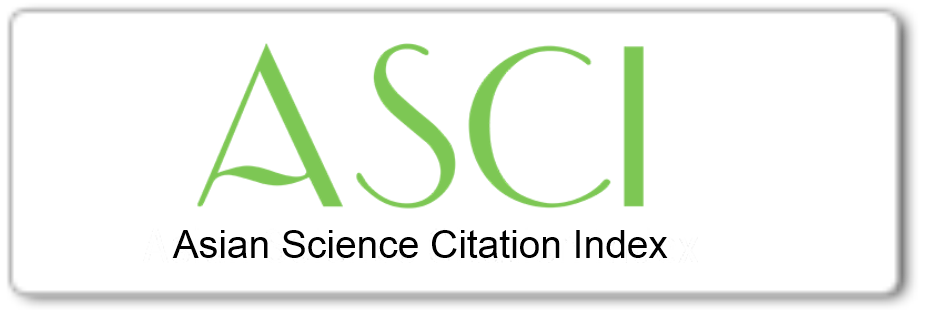Development of a hybrid teaching factory model based on school governance in improving employability skills of vocational students
Tashia Indah Nastiti, Universitas Indraprasta PGRI, Indonesia
Yingdong Liu, Université de Strasbourg, France
Abstract
Keywords
Full Text:
PDFReferences
Agus, A. (2023). Aplikasi model pembelajaran teaching factory untuk meningkatkan minat dan hasil belajar siswa pelajaran pre di SMK Negeri 3 Selong. ACADEMIA: Jurnal Inovasi Riset Akademik, 3(2), 126–133. https://doi.org/10.51878/academia.v3i2.2344
AlGhamdi, R. (2023). Development of soft skills among computing students in online task-based learning: Insights from technical communication course. International Journal of Technology in Education, 6(2), 260–282. https://doi.org/10.46328/ijte.394
Alim, N., Md Saad, M. S., Mahmud, H., & Gunawan, F. (2021). Usability and satisfaction of Google Classroom as an instructional teaching and learning medium: The students’ perspective. World Transactions on Engineering and Technology Education, 19(1), 16–20. http://www.wiete.com.au/journals/WTE&TE/Pages/Vol.19, No.1 (2021)/02-MdSaad-M.pdf
Brzezicki, M. (2020). Strengths and weaknesses of architectural education on-line classes conducted during COVID-19. World Transactions on Engineering and Technology Education, 18(4), 381–386. http://www.wiete.com.au/journals/WTE&TE/Pages/Vol.18, No.4 (2020)/03-Brzezicki-M.pdf
Chi, J. (2022). Research on hybrid teaching model based on human-machine collaboration. BCP Education & Psychology, 5, 19–24. https://doi.org/10.54691/bcpep.v5i.1568
Coyanda, J. R., Ricoida, D. I., & Verano, D. A. (2023). Pelaksanan ujian kompetensi IT dalam meningkatkan kualitas lulusan di SMKN Suak Tapeh Banyuasin. AKM: Aksi Kepada Masyarakat, 4(1), 191–198. https://doi.org/10.36908/akm.v4i1.858
Endang, M., & Kuat, T. (2023). Teaching factory implementation to grow the entrepreneurship character of vocational school students. Journal of Vocational Education Studies, 6(1), 52–61. https://doi.org/10.12928/joves.v6i1.8094
Farrell, C. (2014). School governance in Wales. Local Government Studies, 40(6), 923–937. https://doi.org/10.1080/03003930.2012.719400
Guerrero-Quiñonez, A. J., Bedoya-Flores, M. C., Mosquera-Quiñonez, E. F., Ango-Ramos, E. D., & Lara-Tambaco, R. M. (2023). Hybrid education: Current challenges. Ibero-American Journal of Education & Society Research, 3(1), 276–279. https://doi.org/10.56183/iberoeds.v3i1.629
Ilkovičová, Ľ., & Ilkovič, J. (2021). Industry 4.0 in architecture education. World Transactions on Engineering and Technology Education, 19(3), 331–336. https://www.researchgate.net/profile/L-Ilkovicova-2/publication/356086506_Ilkovicova-Ilkovic_Industry_40/links/618b9f953068c54fa5c890a4/Ilkovicova-Ilkovic-Industry-40.pdf
Krishnan, J., & Nagaratnam, S. (2023). Hybrid learning: A boon or bane. 2023 11th International Conference on Information and Education Technology (ICIET), 256–261. https://doi.org/10.1109/ICIET56899.2023.10111373
Kristanto, K., Kuat, T., & Noor, B. (2023). The contribution teaching factory on practical learning process, production process and vocational school quality. Journal of Social Science (JoSS), 2(5), 446–455. https://doi.org/10.57185/joss.v2i5.72
Leechman, G., McCulla, N., & Field, L. (2019). Local school governance and school leadership: Practices, processes and pillars. International Journal of Educational Management, 33(7), 1641–1652. https://doi.org/10.1108/IJEM-12-2018-0401
Lhafra, F. Z., & Abdoun, O. (2023). Integration of adaptive collaborative learning process in a hybrid learning environment. International Journal on Advanced Science, Engineering and Information Technology, 13(2), 638–650. https://doi.org/10.18517/ijaseit.13.2.16608
Ma, Z. (2023). Hybrid learning: A new learning model that connects online and offline. Journal of Education and Educational Research, 3(2), 130–132. https://doi.org/10.54097/jeer.v3i2.9059
Mourtzis, D., Panopoulos, N., & Angelopoulos, J. (2023). A hybrid teaching factory model towards personalized education 4.0. International Journal of Computer Integrated Manufacturing, 36(12), 1739–1759. https://doi.org/10.1080/0951192X.2022.2145025
Nadiyah, R. S., & Faaizah, S. (2015). The development of online project based collaborative learning using ADDIE model. Procedia - Social and Behavioral Sciences, 195, 1803–1812. https://doi.org/10.1016/j.sbspro.2015.06.392
Nash, C., Jarrahi, M. H., Sutherland, W., & Phillips, G. (2018). Digital nomads beyond the buzzword: Defining digital nomadic work and use of digital technologies. In International conference on information (pp. 207–217). Springer International Publishing. https://doi.org/10.1007/978-3-319-78105-1_25
Nasrum, A., Subawo, M., & Hidayati, U. (2023). The role of Moodle in education: A bibliometric review. JME (Journal of Mathematics Education), 8(1), 27–36. https://doi.org/10.31327/jme.v8i1.1903
Olapiriyakul, K., & Scher, J. M. (2006). A guide to establishing hybrid learning courses: Employing information technology to create a new learning experience, and a case study. The Internet and Higher Education, 9(4), 287–301. https://doi.org/10.1016/j.iheduc.2006.08.001
Pahmi, S., Hudaya, C., & Jaya, A. (2023). Pengaruh model pembelajaran Tefa (Teaching Factory) dalam pembelajaran fisika untuk meningkatkan hasil belajar siswa SMK. ORBITA: Jurnal Pendidikan Dan Ilmu Fisika, 9(1), 1–15. https://doi.org/10.31764/orbita.v9i1.11718
Peng, F., Wang, S., & Yan, T. (2023). Enhancing vocational education through innovative skills competitions: Challenges and solutions. Journal of Contemporary Educational Research, 7(7), 8–12. https://doi.org/10.26689/jcer.v7i7.5071
Rojhi, M. (2022). Implementation of teaching factory learning based on mockup products on competency of modeling design and building information skills at SMK Negeri 1 Adiwerna. Proceedings of the 1st International Conference on Law, Social Science, Economics, and Education, MALAPY 2022, 28 May 2022, Tegal, Indonesia, 39. https://doi.org/10.4108/eai.28-5-2022.2320376
Rosmiati, R., & Hendriani, S. (2023). Implementasi model pembelajaran soft-skills dalam membentuk moralitas siswa di SMP N 11 Sijunjung. Jurnal Kajian Dan Pengembangan Umat, 6(1). https://doi.org/10.31869/jkpu.v6i1.3966
Safitri, M. (2022). Strategi pengembangan soft skills dalam pembelajaran PAI di SMK Negeri 1 Praya. EL-HIKMAH: Jurnal Kajian Dan Penelitian Pendidikan Islam, 16(2), 159–186. https://doi.org/10.20414/elhikmah.v16i2.6240
Siagian, S., Sinambela, P. N. J. M., & Wau, Y. (2020). Effectiveness and efficiency of e-learning in Instructional Design. World Transactions on Engineering and Technology Education, 18(1), 73–77. http://www.wiete.com.au/journals/WTE&TE/Pages/Vol.18,%20No.1%20(2020)/13-Siagian-S.pdf
Soleh, A. A., Triyanto, T., Parno, P., Suharno, S., & Estriyanto, Y. (2023). Tinjauan pustaka sistematis: model kemitraan antara SMK dengan dunia usaha dan dunia industri. JIPTEK, 16(2), 126–136. https://doi.org/10.20961/jiptek.v16i2.72697
Sudhoff, M., Prinz, C., & Kuhlenkötter, B. (2020). A systematic analysis of learning factories in Germany - concepts, production processes, didactics. Procedia Manufacturing, 45(2019), 114–120. https://doi.org/10.1016/j.promfg.2020.04.081
Sugiyono, S. (2022). Metode penelitian kuantitatif, kualitatif, dan R&D (2nd ed.). Alfabeta.
Suparjan, S., Ismiyani, N., Mariyadi, M., Shintasari, D., & Kresnadi, H. (2023). Investigating students’ perspectives on the use of e-learning MOODLE. AL-ISHLAH: Jurnal Pendidikan, 15(1), 235–246. https://doi.org/10.35445/alishlah.v15i1.2889
Suroto, S., Pargito, P., Sukirlan, M., Firdaus, R., Winatha, I. K., Rahmanto, A. A., & Rozak, A. (2023). Communication skills and their relation to transferable skills for vocational high school students. Journal of Economics Education and Entrepreneurship, 4(1), 1–7. https://doi.org/10.20527/jee.v4i1.8017
Vitriani, V., Okmayura, F., Ali, G., & Satria, R. (2023). Teaching factory model using flipped classroom and knowledge management system based in improving 21st century competencies in vocational high schools. AL-ISHLAH: Jurnal Pendidikan, 15(2), 1347–1356. https://doi.org/10.35445/alishlah.v15i2.3785
Wahyudi, W., Yahya, M. D., Jenuri, J., Susilo, C. B., Suwarma, D. M., & Veza, O. (2023). Hubungan penggunaan multimedia dalam pembelajaran terhadap peningkatan hasil belajar peserta didik. Journal on Education, 6(1), 25–34. https://doi.org/10.31004/joe.v6i1.2910
Yudiastuti, S. O. N., & Hasia, I. M. (2023). Chilli sauce medium reformulation of lemuru fish in cans at teffa canning Politeknik Negeri Jember. Jurnal Ilmiah Inovasi, 23(1), 1–9. https://doi.org/10.25047/jii.v23i1.3465
Yuen, T. W. W., Cheng, C. K. E., Guo, C., & Leung, Y. W. (2019). The civic mission of schools and students’ participation in school governance. Asian Education and Development Studies, 9(2), 229–241. https://doi.org/10.1108/AEDS-06-2019-0095
DOI: https://doi.org/10.21831/jpv.v14i1.65108
Refbacks
- There are currently no refbacks.

This work is licensed under a Creative Commons Attribution-ShareAlike 4.0 International License.
Our journal indexed by:
















